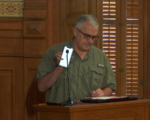U.S. Voters Turn to Courts for Election Access Ahead of 2024 Presidential Election

For Ericka Worobec, a resident of Cecil, Pennsylvania, mail-in voting is a family tradition that she shares with her young son. However, after discovering that her ballot was rejected due to an incomplete date, she felt deeply concerned about the accuracy of the election. Worobec, who votes by mail due to her autoimmune condition, is one of many Americans turning to the courts to ensure their votes are counted in the upcoming November 2024 presidential election.
Worobec’s experience reflects a growing number of lawsuits in the United States surrounding election access and voting rights. With 95 election-related lawsuits filed across seven key battleground states—Arizona, Georgia, Michigan, North Carolina, Nevada, Pennsylvania, and Wisconsin—voters, advocacy groups, and political parties are seeking judicial intervention on a wide range of issues, from absentee ballot errors to polling place accessibility. These legal battles are fueled by the contentious presidential race between Democratic candidate Vice President Kamala Harris and her Republican challenger, former President Donald Trump.
A Nation Divided: Voting Access vs. Election Integrity
The lawsuits often fall along partisan lines, with Democrats advocating for expanded voting access and Republicans emphasizing the need for election integrity. Democrats argue that voter suppression tactics limit eligible voters’ participation, while Republicans claim that looser regulations invite fraud. These legal battles are seen as critical, with both parties fighting for every vote in a tight race.
Worobec’s case is an example of this divide. After being approached by the American Civil Liberties Union (ACLU), she joined a lawsuit against her county’s election board, challenging the rejection of mail-in ballots with minor errors. A Republican intervention in the case defended the election board’s actions, but a judge ruled in favor of Worobec, mandating that voters be notified of ballot errors in time to cast provisional ballots.
Mixed Success in Court Challenges
While some voters, like Worobec, have seen favorable rulings, others have struggled to gain traction in the courts. Tyler Engel, a 35-year-old from Madison, Wisconsin, who suffers from muscular dystrophy, has faced challenges accessing his polling place. Unable to mark a paper ballot on his own, Engel sought a legal solution that would allow him to vote electronically without assistance. Though a lower court ruled in his favor, allowing electronic ballots, the ruling is on hold, leaving Engel and other disabled voters in uncertainty.
In Michigan, the Republican National Committee (RNC) has sued over the governor’s decision to designate Veterans Administration (VA) and Small Business Administration (SBA) offices as voter registration agencies. The Vet Voice Foundation, a nonpartisan group supporting veterans, attempted to intervene, arguing that veterans, particularly those who are homeless, rely on these agencies for registration. Despite the group’s efforts, a judge denied their request, leaving the case unresolved. The RNC has criticized the initiative as a partisan move, while advocates for veterans argue that it’s crucial for facilitating voter access.
Tribal Voters Seek Representation
In Montana, a lawsuit filed by members of the Fort Peck Assiniboine and Sioux Tribes underscores the challenges faced by Native American voters. Some tribal members live over 20 miles from the nearest election office, making it difficult to vote. The plaintiffs have requested satellite voting offices to be open daily in the six weeks leading up to the election, arguing that their voices deserve to be heard despite their geographic isolation. Settlement talks are currently underway, with local officials citing resource limitations but promising to provide some level of satellite voting access.
As the November election approaches, these cases reflect the broader battle for voting rights in the United States, with legal challenges emerging in response to the evolving landscape of mail-in voting, polling place accessibility, and voter registration procedures. With the stakes high in this 2024 presidential election, both voters and advocacy groups are fighting to ensure their ballots are counted in a race that could hinge on every vote.





















